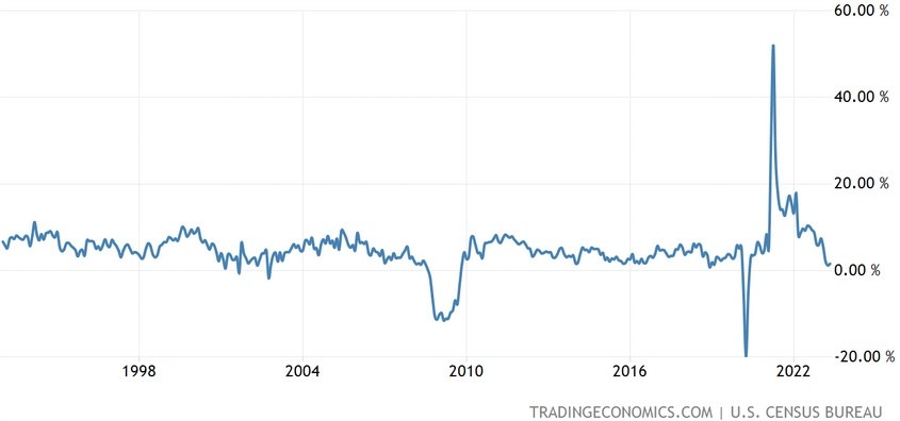UPCOMING EVENTS:
Monday: PBoC MLF.
Tuesday: US Retail Sales, Canada CPI.
Wednesday: New Zealand CPI, UK CPI.
Thursday: PBoC LPR, Australia Jobs Report, US Jobless Claims.
Friday: Japan CPI, UK Retail Sales.
Monday: There’s no expectations for the PBoC to cut the MLF rate as the recent comments by the PBoC deputy governor Liu Guoqiang last Friday indicated that there’s no fear of deflation as they expect inflation to have a U-shaped recovery in the second half of the year. The Medium-Term Lending Facility Rate (MLF) is the main rate at which the central bank lends to big commercial banks. The MLF acts as a guide for the Loan Prime Rate (LPR).

Tuesday: The US Retail Sales are expected to increase by 0.5% vs. 0.3% prior, while the Core measure is seen at 0.3% vs. 0.1% prior. The Control Group is expected to rise by 0.2% vs. 0.2% prior. The US data has showed strength lately and the last week the big miss in US Core CPI coupled with the big jump in Consumer Sentiment on Friday, is giving the soft-landing narrative a tailwind. The Retail Sales report should miss by a very big margin to cause fear in the markets at this point.

The Canada CPI Y/Y is expected at 2.9% vs. 3.4% prior and the M/M figure at 0.3% vs. 0.4% prior. The Bank of Canada is focused on underlying inflation measures for its policy decisions, so the data points to watch are the Core CPI and the BoC’s favourite measures: CPI-common expected at 5.0% vs. 5.2% prior, CPI-trimmed expected at 3.6% vs. 3.8% prior and CPI-median expected at 3.7% vs. 3.9% prior.

Wednesday: The New Zealand CPI (Q2) Y/Y is expected at 5.9% vs. 6.7% prior, while the Q/Q reading is seen at 0.9% vs. 1.2% prior. The RBNZ last week left its official cash rate unchanged at 5.5% as expected as the central bank aims at “remaining at the restrictive level for the foreseeable future to ensure that consumer price inflation returns to the 1-3% annual target range”.

The UK CPI Y/Y is expected at 8.2% vs. 8.7% prior and the M/M figure is seen at 0.4% vs. 0.7% prior. The Core CPI Y/Y is expected at 6.8% vs. 7.1% prior, while the M/M reading is seen at 0.4% vs. 0.8% prior. Last time both the employment and inflation reports surprised to the upside and prompt the BoE to surprise with a 50-bps rate hike. This time the employment report surprised on the wages side but missed on the jobs side, so if we see a miss in the data, the BoE should go ahead with a 25-bps increase. On the other hand, if the data runs hot again, they should hike by another 50 bps.

Thursday: The PBoC is likely to change the LPR rates only if it surprises with a change in the MLF rate on Monday.
Last time the Australian Jobs report surprised to the upside across the board. This time the expectations are for Employment Change to increase by 17.0K vs. 75.9K prior and the Unemployment Rate to remain unchanged at 3.6% and the Participation Rate at 66.9%. The RBA would like some softening in the labour market to bring inflation back to target.

The US Initial Claims are expected at 243K vs. 237K prior and Continuing Claims at 1725K vs. 1729K prior. The US Labour Market remains very strong and we haven’t seen any notable sign of weakness yet with Jobless Claims still running near record lows.

Friday: The Japan CPI Y/Y is expected at 3.5% vs. 3.2% prior and the Core Y/Y reading is seen at 3.3% vs. 3.2% prior. The CPI ex-Food & Energy Y/Y is expected at 4.2% vs. 4.3% prior which is the highest reading in four decades. The BoJ is still stuck with its dovish monetary policy, and they haven’t hinted to any change at the upcoming meeting. Nevertheless, there are expectations for a tweak in the YCC policy as the BoJ is seen raising its FY2023 inflation forecast above 2% and a former BoJ director said that he expects the central bank to widen the YCC band from -/+ 0.50% to -/+1.00% at the July meeting.




